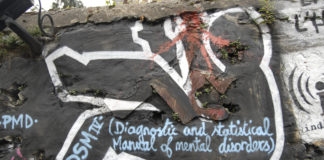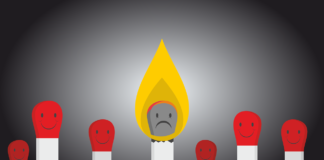Tag: Depression
Researchers Challenge Evidence for Antidepressants in Youth
Researchers shed light on the precarious nature of evidence from efficacy trials of antidepressant medication to treat symptoms of major depressive disorder in children and adolescents.
NICE Guideline Update Acknowledges Severe Antidepressant Withdrawal
A new update to the NICE guideline for depression suggests providers discuss long-term, severe antidepressant withdrawal symptoms.
Smartphones, Loneliness, and Depression in Teens
New study finds that smartphone use may precede experiences of loneliness and depressive symptoms among older teens according to longitudinal analysis.
“Flimsy Evidence” for Esketamine as Depression Treatment
A new article documents the “flimsy evidence” behind the recent FDA approval of the party drug esketamine for the treatment of depression.
Discrimination Leads to Mental Distress for Gender Diverse People
Researchers seek to identify adaptive coping responses to discrimination for the transgender and gender diverse community.
Non-Gender Affirmative Treatment Detrimental to Mental Health
Gender identity conversion efforts impact psychological distress and lifetime suicidality in transgender people.
Clinical Trials Show Antidepressants “Not Beneficial in the Long Term”
Clinical trials also consistently fail to measure and report long-term harmful effects.
Clinical Guidelines for Depression Need Urgent Revision
A coalition of 35 health organizations expressed serious concerns that the NICE guideline for adult depression may cause clinical harm—they demand “full and proper” revisions.
Researchers: “Antidepressants Should Not be Used for Adults with Major Depressive...
A new review, published in BMJ Evidence-Based Medicine, concludes that antidepressants should not be used as the risks outweigh evidence for benefits.
Decontextualized Depression and PTSD Diagnoses Fail Indigenous Communities
A case analysis of an American Indian woman illustrates how the DSM diagnostic criteria misrepresent the lives of indigenous people.
Zoloft Does Not Improve Depression, Even in Severe Cases, Study Finds
Despite their finding, the researchers suggest that SSRIs be given to people who do not meet criteria for depression or anxiety.
Antidepressant Use Associated With More Violent Suicide Attempts
A new study found that taking an antidepressant medication was associated with a heightened risk of suicide using violent means.
Antidepressant Use Does Not Prevent Suicide, Study Finds
A new study has found that antidepressants are ineffective for reducing suicide attempts. Researchers report that the risk of suicide is particularly high in the first month after starting an antidepressant.
Therapy Gets More Effective Over Time While Antidepressants Decrease in Effectiveness
New review of long-term depression data finds psychotherapy more effective over time whereas antidepressants decrease in effectiveness.
Guidelines Recommending Antidepressants “in Contradiction with the Current Evidence”
Researchers critique the German S3 guidelines for depression promoting antidepressants.
William James’s Letter to His Depressed Daughter
If you discover that your child has been experiencing a bout with depression, what wise words might you share? Brilliant psychologist William James was forced to address this issue himself when his 13-year-old daughter, Peg, began to struggle with melancholy. I present his long, thoughtful reply for your consideration.
Explaining Depression Biologically Increases Prognostic Pessimism
Psychoeducation that explains depression in biological terms increases prognostic pessimism, perceived stability of depression, and openness to psychiatric medication.
No Evidence for Brain Asymmetry in Depression
A new study debunks the theory that depression is associated with brain asymmetry.
Adding Fluoxetine to Therapy Not Superior to Therapy Alone in Depressed...
The addition of fluoxetine to CBT did not further reduce depressive symptoms in young people with moderate-to-severe depression.
Antidepressants Blunt Ability to Feel Empathy
A new study suggests that taking antidepressants impairs empathy, while the experience of depression itself does not.
Positive Antidepressant Study “Misleading” and “Erroneous”
An analysis of last year’s positive finding in The Lancet about antidepressant efficacy shows errors, obfuscations, and misrepresentations.
Antidepressant Use More Than Doubles Risk of Suicide Attempts
Throughout the past two decades, studies have warned of increased suicide rates in those taking antidepressants, especially in children and adolescents. Researchers also documented...
Traffic Pollution Linked to Anxiety and Depression in Childhood
New research explores the impact of exposure to traffic-related air pollution on levels of anxious and depressive symptoms in childhood.
Researcher Critiques Misleading Claims About Antidepressants
Recent claims about antidepressant effectiveness have been based on misleading statements and misunderstandings of the science.
Burnout is Indistinguishable from Depression, Researchers Find
Despite burnout being officially recognized as a syndrome, research suggests it overlaps considerably with current understandings of depression.

































